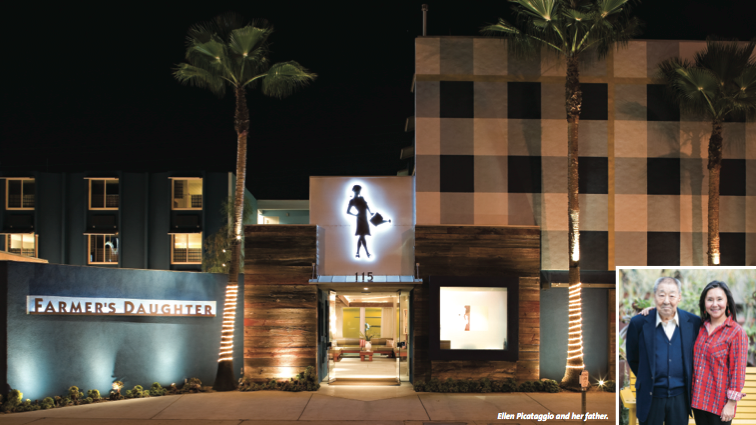by JIMMY LEE
Like so many in Los Angeles, the Farmer’s Daughter is getting a facelift. And although this boutique hotel still has its sharp looks that attract a high-style clientele, the establishment is going under the saw, as well as sledgehammer and paintbrush, for the second time in less than 20 years.
The oversized pitchforks and pails that have hung on some of the exterior walls are coming down, as kitschiness is being replaced with a more understated interpretation of rustic farmland and Americana. Common areas are being opened up, like the lobby, with pop-up retail selling items from local artists and designers being thrown into the mix. Guestrooms are being redesigned to have open floor plans, with no walls between the bed and the glass-enclosed commode — you’ll have to close the curtain if you desire privacy.
 One of the redesigned rooms at the Farmer’s Daughter. (Photo courtesy of Farmer’s Daughter Hotel)
One of the redesigned rooms at the Farmer’s Daughter. (Photo courtesy of Farmer’s Daughter Hotel)
For Ellen Picataggio (née Cho) and her husband Peter, who own the property, these new changes are just part of an ongoing evolution at Farmer’s Daughter, located in a prime location next to The Grove, the historic Farmer’s Market and CBS Television City, to better reflect the brand they want to project.
“We love the idea of country as being interpreted as traditional values and a deep-rooted salt of the earth-type thing. But it’s also trailblazing and not close-minded,” says Ellen, describing the brand’s image. “If you think of the early settlers, they are ‘tradition’ to us. But they were [also] visionaries and gamblers and dreamers.”
So now Ellen is injecting her own vision into these renovations. She’s commissioned artists to produce a different diorama with the theme “What does the farm mean to you” for each room. “The way I design is I start with a story,” says Ellen. And with the tagline of “The farmer’s daughter is all grown up,” the dioramas, along with the new decor and its nods to mid-century modern style, seem to suit the hotel’s story fittingly. But if not for a family tragedy, the story of how the Farmer’s Daughter came to be could have been much different.
 An Art-O-Mat vending machine. (Photo courtesy of Farmer’s Daughter Hotel)
An Art-O-Mat vending machine. (Photo courtesy of Farmer’s Daughter Hotel)
Ellen has a long background in hospitality. After emigrating from Korea, the Cho family bought Surftides, a seaside resort in Lincoln City, Oregon. Growing up, starting from the age of 10, Ellen worked every facet of the hotel, from the laundry room and housecleaning to managing the restaurant.
But Ellen craved creativity and, specifically, a career in fashion. “I wanted nothing of the family business,” she says. She eventually became an operations manager for a clothing manufacturer based in Berkeley, California, overseeing production overseas.
Her parents meanwhile had bought the Farmer’s Daughter after they had retired to Los Angeles, with the plan of having Ellen’s older sister run it. Her death in a car accident about one year after its purchase, however, changed everything.
“When [my sister] died, we just kind of fell in line,” says Ellen, who quit her job and moved to Southern California to take over the hotel. “It wasn’t a choice at that point.” She asked Peter, whom she was dating at the time and who worked for a software company in Silicon Valley, to help run what was a far different establishment in the mid-1990s.
“Hookers and drug addicts, that’s what it was,” says Peter, describing the clientele back then.
But soon enough, Ellen and Peter began making changes. “[Peter] really pushed my dad, and my parents were very reluctant,” says Ellen. “Can you imagine going to Korean parents — and we’re making money — saying, we need to borrow a million dollars because we’re going to renovate it. And they’re saying, ‘Why?’ That was a really hard thing.”
 Tart (Photo courtesy of Ross Laurence)
Tart (Photo courtesy of Ross Laurence)
After their first remodel in 1999, revenue doubled, so they were clearly onto something. They then took on the task of converting an adjacent storage shed into a restaurant and bar called Tart, which in turn would introduce them to a chef named Nick Erven. Erven clearly had larger ambitions, and the Picataggios decided to invest in Erven when it came time to open his own restaurant.
“The guy can cook his ass off,” says Peter. “I can’t [cook like] that, but I want to partner with someone who can.” So last summer, Saint Martha, named for the patron saint of cooks and servants, opened in a nondescript strip mall in Koreatown, with Erven’s modern cuisine earning stellar reviews.
 Saint Martha (Photo courtesy of Mike Kelley-Ryan Phillips)
Saint Martha (Photo courtesy of Mike Kelley-Ryan Phillips)
What has also gained people’s attention is Ellen’s interior design for the space. There are no windows and mostly monochromatic, bare walls — “colors that you would imagine in an old convent or old church,” describes Ellen. But then there are decorative pieces like an oil painting of the saint, but with a tattoo down her neck, giving the space a sense of irreverence. “That is what Nick is to us: He’s that mixture of classic yet totally punk rock,” says Ellen.
So from designing restaurants to hotels, Ellen has become the creative force that she had always envisioned for herself. “I got to do the things I wanted to do in a very roundabout way,” she says. “But I’m not dead yet, and I’ve got that sewing machine [Peter gave me for Christmas]. And I would say the next part of my life is hopefully really focused on some fashion or retail world.”
___
Originally published on Audrey Magazine









